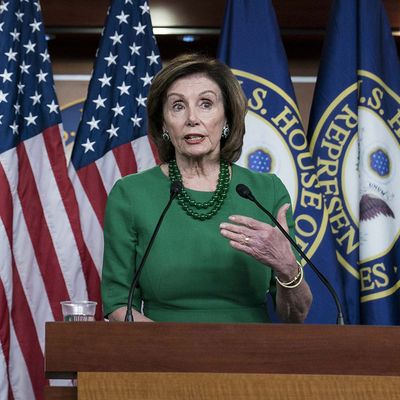
Democrats must learn to stop worrying and love sending all Americans free money.
The party’s response to the coronavirus crisis has been superior to the GOP’s in every respect. Congressional Democrats were sounding alarms about the need for a massive federal response to the burgeoning pandemic back when the Trump administration was still declaring the virus “contained,” and advising Americans to pour their savings into the stock market. After the president’s wishful denialism left the U.S. with no means of preempting a public health catastrophe save for economy-eviscerating social distancing measures, congressional Democrats have pressed for aid to the most vulnerable — while Republicans have prioritized bailouts for casinos.
Nevertheless, Democrats are struggling to override some of their own outmoded ideological impulses. In its initial relief package, Nancy Pelosi’s caucus aimed to use the present crisis as an opportunity for advancing its preexisting vision for providing Americans with paid leave through the mechanism of an employer mandate. This might be a defensible approach to establishing such benefits in ordinary times. But in a moment when wide swathes of the corporate sector are being forced into hiatus through no fault of their own, increasing their labor expenses risks accelerating layoffs and business failures. The proper policy in this context is to finance a universal paid-leave benefit through deficit financing. After all, with global investors desperate for safe assets, the U.S. can effectively borrow money at zero percent interest.
Instead, the House Speaker took a bizarre stand against financing leave for Americans who work at large corporations, tweeting, “I don’t support U.S. taxpayer money subsidizing corporations to provide benefits to workers that they should already be providing.” In (very rough) figurative terms, Pelosi was evincing a preference for allowing some of those drowning to go without life preservers, if that’s what it took to prevent wasting preservers on those who were perfectly capable of swimming to shore on their own.
In reality, the speaker may have been trying to put a progressive spin on a concession to the GOP. But the same basic impulse to value distributionally progressive aid measures — over more rapid and comprehensive ones — informs House Democrats’ resilient opposition to simply sending every U.S. adult a large check as soon as possible. As the Washington Post reports:
House Majority Whip James E. Clyburn (D-S.C.) and Financial Services Committee Chairwoman Maxine Waters (D-Calif.) argued for outgunning Republicans on the size of the cash payments, according to three participants on the call. Waters, for instance, circulated a plan Wednesday calling for $2,000 per adult and $1,000 per child monthly stipend until the crisis abates.
But other Democrats — including Speaker Nancy Pelosi (D-Calif.) — while not ruling out direct payments, urged a more balanced course. Multiple committee chairmen argued that beefing up existing safety net programs — such as unemployment insurance and Medicaid, as well as small business assistance, would provide more targeted and effective relief.
Contrary to initial reports, the opposition to universal cash relief isn’t exclusive to Democrats. In fact, Republicans reportedly favor a sociopathic reverse means-testing plan that would deny relief to Americans who earn too little.
Meanwhile, Democrats’ desire to concentrate relief on the most vulnerable is understandable. Material need was distributed wildly unequally in the United States before the onset of this pandemic. And the impact of the crisis itself has been extremely disparate, with many white-collar workers capable of working remotely seeing no loss of income, even as enormous numbers of working-class service workers have lost their jobs. The mistake that Pelosi and like-minded Democrats are making, however, is to imagine that federal dollars are a fixed resource that must be rationed. In reality, increasing the dissemination of a currency the U.S. can print — and which is becoming too strong for our own good on international currency markets — does not produce scarcity. What creates scarcity is failing to get dollars into the hands of everyone who needs them to keep their household finances stable and capital stock in working order, such that they can return to their precrisis levels of productivity as soon as the pandemic has passed.
Put differently, dollars are not real resources but tools for facilitating and structuring economic activity. The size of the economic pie that’s available for divvying up, meanwhile, is not a fixed quantity; our collective capacity to generate wealth from real resources diminishes when firms lose institutional knowledge because they were forced to lay off and replace their entire staffs, or when individuals drop out of school because they racked up unpaid debts during a crisis. Thus, the faster Congress can replace the income that businesses and individuals are currently losing, the larger the economic pie will be in the future. For this reason, to the extent that it is easier and quicker to mail every U.S. adult a check than it is to means-test such benefits, the universal route may well be cheaper than the narrowly targeted (in addition to being more broadly popular).
Once the checks are out the door, Democrats can spearhead a public campaign encouraging those who don’t need the aid to donate their checks to worthy causes. And when and if the party returns to power, it can factor this year’s giveaway into the one percent’s new tax rate. But right now, the economy needs all the cash it can get.
We’re committed to keeping our readers informed.
We’ve removed our paywall from essential coronavirus news stories. Become a subscriber to support our journalists. Subscribe now.






























